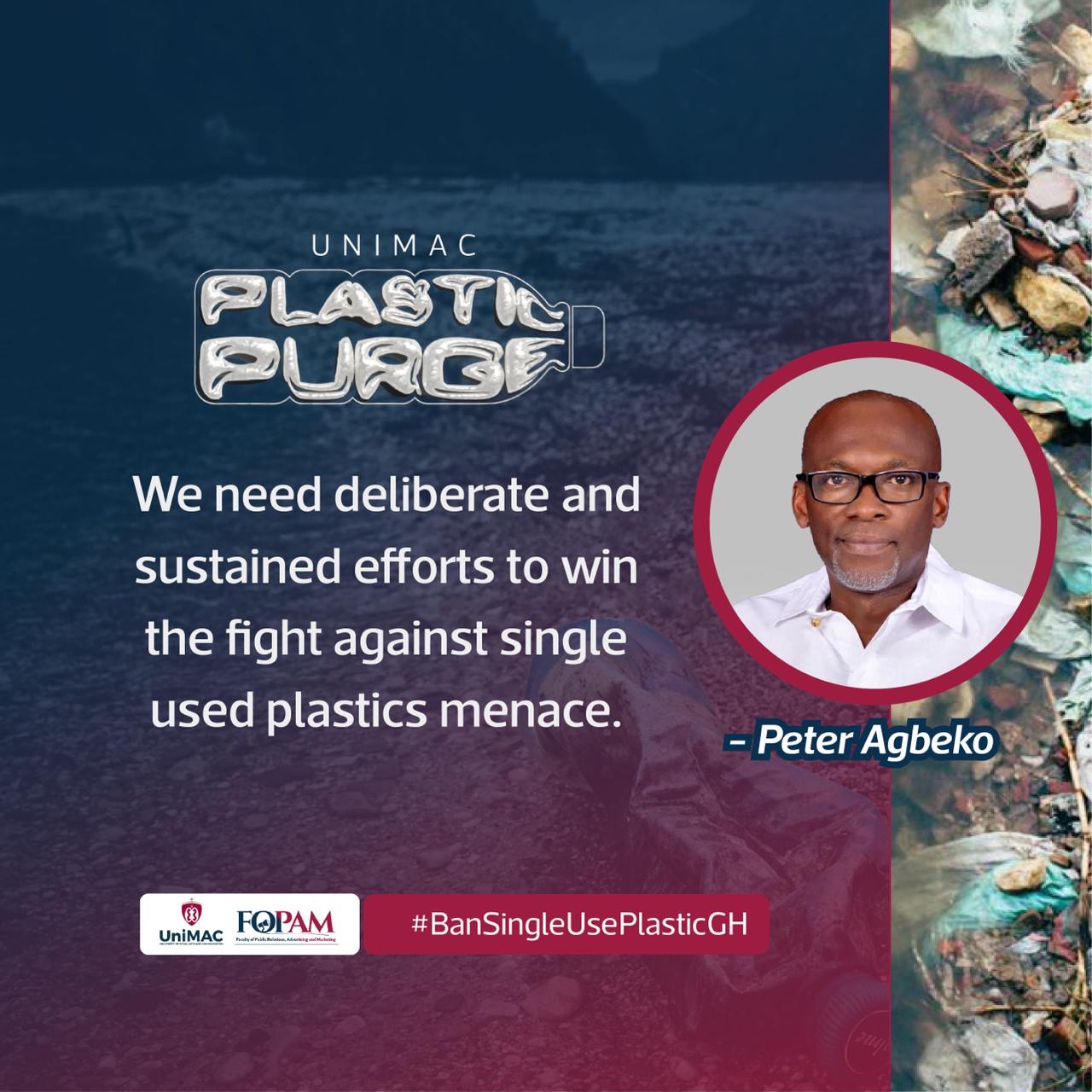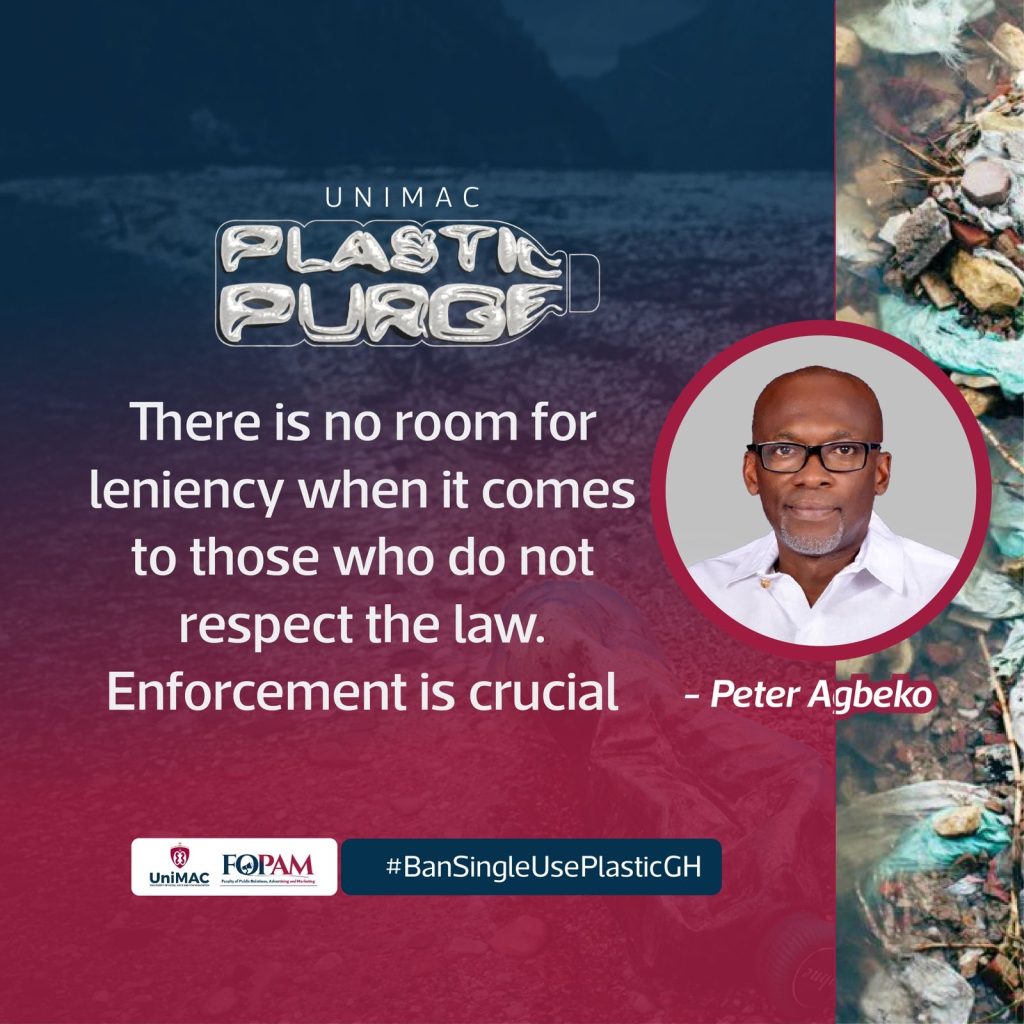We Need Deliberate and Sustained Efforts to Win the Fight Against Single-Use Plastics – Peter Agbeko

As part of the #BanSingleUsePlasticsGH campaign by students of the Department of Public Relations and Marketing at the University of Media, Arts & Communication – Institute of Journalism (UniMAC-IJ), seasoned Communications Specialist Peter Martey Agbeko, APR, delivered a thought-provoking presentation on the urgency of tackling plastic pollution in Ghana. Under the theme “Tackling Single-Use Plastics Menace: Lessons from the Rwandan Model,” Agbeko emphasized that Ghana must take bold, deliberate, and sustained action to win the fight against single-use plastics.

The Scale of the Problem
Plastic pollution is a global environmental crisis, with over 400 million tons of plastic waste produced annually. Ghana alone generates an estimated 1.1 million metric tons of plastic waste each year, yet only 5% is recycled—a figure Agbeko strongly condemned, stating:
“5% of recycling is not good enough”
POLITICS: Why Dr. Mahamudu Bawumia Is the Best Candidate for NPP in 2028
The remaining plastic waste pollutes the environment, clogs drainage systems, worsens urban flooding, and endangers wildlife. Despite existing policies, such as Ghana’s National Plastics Management Policy (2020), weak enforcement has allowed plastic waste to persist as a major environmental hazard.

Rwanda’s Success Story: A Model for Ghana
Rwanda stands out as a global leader in plastic waste management, having implemented a total ban on non-biodegradable plastic bags in 2008. In 2019, the ban was extended to include single-use plastics such as straws, cups, and cutlery. Rwanda’s remarkable success is attributed to:
• Strong political will – The government’s commitment to enforcing environmental laws.
• Strict enforcement – Ensuring full compliance with the plastic ban.
• Community engagement – Public awareness campaigns fostering behavioral change.
• Promotion of alternatives – Investment in biodegradable materials like paper, cloth, and bamboo-based products.
• Robust waste management infrastructure – Establishment of recycling facilities and innovative waste-to-product initiatives.
RELATED POST: It’s time to make Ghana a beacon of hope for environmental protection— Naa Koryoe
Agbeko stressed that enforcement is crucial if Ghana is to make any progress, stating:
“There is no room for leniency when it comes to those who do not respect the law. Enforcement is crucial.”

Key Lessons for Ghana
1. Legislative Action and Enforcement
Strict laws and enforcement are essential to winning the fight against plastic waste. While policies exist, weak implementation has rendered them ineffective. The government must introduce clear penalties for non-compliance and ensure businesses transition to sustainable practices.
2. Promotion of Alternative Packaging
A major challenge to banning plastics is the lack of affordable and accessible alternatives. Ghana must encourage local production of biodegradable packaging materials such as paper, jute, and cloth bags. Supporting businesses that manufacture eco-friendly alternatives will create jobs and reduce reliance on imported plastics.
3. Public Awareness and Behavioral Change
Rwanda’s success was largely due to effective public education. Ghanaians need to be informed about the dangers of plastic pollution and encouraged to adopt eco-friendly habits. Agbeko emphasized:
“Citizens need to adopt eco-friendly practices.”
Schools, religious institutions, and media campaigns can play a major role in changing mindsets and promoting responsible waste disposal.
READ ALSO; UniMAC-IJ Launches Digital Campaign to End Single-Use Plastics in Ghana
4. Investment in Recycling and Waste Management
Ghana’s waste management infrastructure is inadequate, with limited recycling facilities. To effectively tackle plastic waste, the government must:
• Establish more plastic collection and recycling centers.
• Support businesses that convert plastic waste into useful products.
• Provide incentives for companies investing in sustainable waste management.
5. Engagement with the Private Sector
The private sector must be a key stakeholder in Ghana’s fight against plastic pollution. Manufacturers and retailers should be encouraged to:
• Adopt eco-friendly packaging solutions.
• Participate in Extended Producer Responsibility (EPR) schemes, ensuring companies take responsibility for the plastic waste generated by their products.
Challenges and the Way Forward
While implementing a plastic ban in Ghana will come with challenges—including resistance from businesses, high costs of alternatives, and enforcement difficulties—Agbeko believes these can be overcome through:
• Phased implementation to allow businesses and consumers time to adjust.
• Government incentives for companies producing biodegradable alternatives.
• Stronger border control to prevent illegal plastic imports.
The Time for Action is Now
Peter Agbeko’s message was clear: Ghana must act now to prevent the plastic menace from escalating into an irreversible environmental crisis. The success of Rwanda proves that bold policies, strict enforcement, and public participation can drive real change.
“We need deliberate and sustained efforts to win the fight against the menace of single-use plastics.”
Beyond national policies, Agbeko called on all Ghanaians to take responsibility for their environment and support the push for a cleaner, greener country. He reiterated the need to align with President Akufo-Addo’s vision of making Ghana’s capital city a model for cleanliness in Africa, stating:
“We should not give up on the quest to make Accra the cleanest city in Africa.”
READ ALSO; Preparing for the Global Digital Economy: A 6-Month Intensive Training Program
Furthermore, he equated the seriousness of plastic waste management to Ghana’s ongoing fight against illegal mining, saying:
“Plastic waste management is as serious as Galamsey.”
As a strong advocate for environmental sustainability, Agbeko concluded his presentation with a firm commitment to the cause:
“Count on me as your advocate against single-use plastics.”
The #BanSingleUsePlasticsGH campaign by UniMAC-IJ students is a crucial step toward raising awareness and pushing for policy change. The time for action is now—let’s join the fight for a plastic-free Ghana!





2 Responses
[…] MUST READ; We Need Deliberate and Sustained Efforts to Win the Fight Against Single-Use Plastics – Peter Agbe… […]
[…] READ ALSO: We Need Deliberate and Sustained Efforts to Win the Fight Against Single-Use Plastics – Peter Agbe… […]